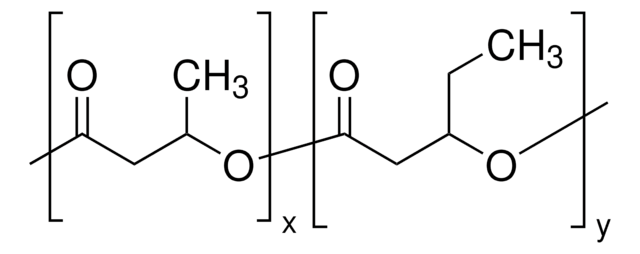939676
Poly(butylene succinate-co-butylene adipate)

average Mw (10kDa)
Synonyme(s) :
PBSA
Se connecterpour consulter vos tarifs contractuels et ceux de votre entreprise/organisme
About This Item
Produits recommandés
Forme
powder, chunks or granules
Niveau de qualité
Poids mol.
average Mw (10kDa)
Couleur
, white to light beige-brown
Description générale
Poly(butylene succinate-co-butylene adipate) (PBSA) is a combination of 1,4-butane diol, succinic acid, and adipic acid. It is a biodegradable, aliphatic polyester polymer that has properties similar to polypropylene and LDPE. PBSA is a sustainable replacement for petrochemical-derived plastics as it can be produced from renewable sources such as biomass. The ester group in the polymer backbone is hydrolytically degradable which makes this polymer advantageous in many applications and fields including sustainable packaging, agriculture, and medicine.
Application
- Recyclable and Sustainable Packaging -including food packaging, films, bags, or boxes
- Cosmetics
- Drug delivery and implants
- Better film forming application
Caractéristiques et avantages
- Faster degradation
- Thermoplastic processability
- Sustainable alternative to petroleum based polymers
- Excellent biodegradability
Code de la classe de stockage
11 - Combustible Solids
Classe de danger pour l'eau (WGK)
WGK 3
Point d'éclair (°F)
Not applicable
Point d'éclair (°C)
Not applicable
Faites votre choix parmi les versions les plus récentes :
Certificats d'analyse (COA)
Lot/Batch Number
Désolés, nous n'avons pas de COA pour ce produit disponible en ligne pour le moment.
Si vous avez besoin d'assistance, veuillez contacter Service Clients
Déjà en possession de ce produit ?
Retrouvez la documentation relative aux produits que vous avez récemment achetés dans la Bibliothèque de documents.
Synthesis and characterization of biodegradable poly(butylene succinate-co-butylene adipate)s
M.S. Nikolic et al.
Polymer Degradation and Stability, 74, 263-270 (2001)
Synthesis and characterization of biobased poly(butylene succinate-ran-butylene adipate). Analysis of the composition-dependent physicochemical properties
T. Debuissy et al
European Polymer Journal, 87, 84?98-84?98 (2017)
Notre équipe de scientifiques dispose d'une expérience dans tous les secteurs de la recherche, notamment en sciences de la vie, science des matériaux, synthèse chimique, chromatographie, analyse et dans de nombreux autres domaines..
Contacter notre Service technique






![Poly[(R)-3-hydroxybutyric acid] natural origin](/deepweb/assets/sigmaaldrich/product/structures/129/476/7d1c924b-f644-4889-a2d6-d7a923ce382c/640/7d1c924b-f644-4889-a2d6-d7a923ce382c.png)
